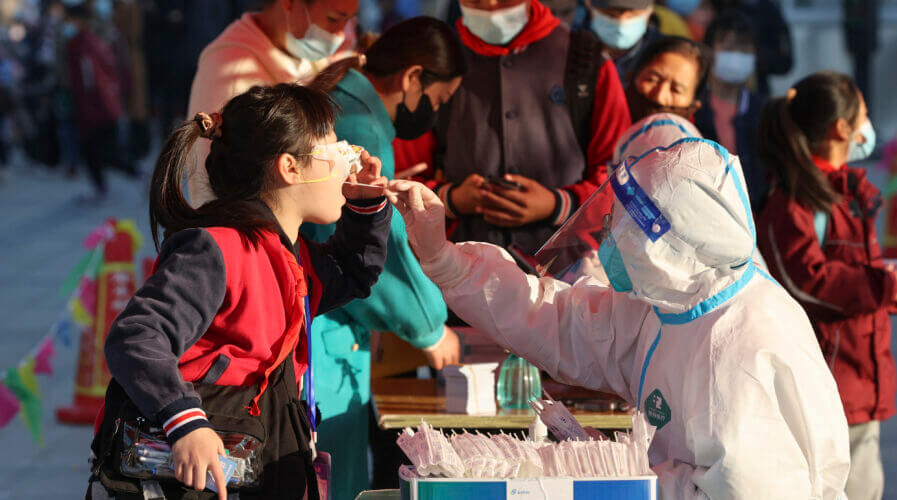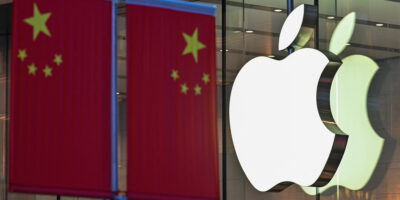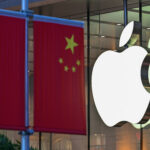
iPhone for Christmas? Covid cases in China might force you to change your plans.(Photo by AFP) / China OUT
iPhone for Christmas? Covid in China may change your plans
- Tightening Covid-19 curbs in China might lead to a 30% slump in production at Apple Inc’s biggest iPhone factory at Zhengzhou.
- Apple’s manufacturer Foxconn may be forced to boost production at another factory in Shenzhen city to make up for the shortfall.
- Apple has warned of a holiday slowdown.
Apple has based most of its supply chain in China, a strategy the company has long had intentions to change. Until then, the US tech giant is left exposed to Beijing’s rigid zero-Covid strategy. Apple Inc’s biggest manufacturer, Foxconn, produces 70% of iPhone shipments globally. While the Taiwanese company also builds the device in India, at its Zhengzhou facility in China, Foxconn assembles the majority of its global output.
Unfortunately, last week, the plant was rocked by discontent over stringent measures to curb another breakout of Covid-19. To make matters worse, a handful of workers were sighted fleeing the site over the weekend after complaining about their treatment and provisions via social media. It started in mid-October when Foxconn was wrestling with a Covid-19 outbreak at its facility in Zhengzhou, the capital of Henan province in central China.
Workers were locked in to stop the spread of the virus to the outside world. Foxconn has repeatedly refrained from disclosing the caseload. For context, under China’s ultra-strict zero-Covid-19 policies, localities must act swiftly to quell outbreaks, with measures including full-scale lockdowns. Factories in affected areas are often allowed to stay open on the condition that they operate under a “closed loop” system where staff live and work on-site. Businesses have said such arrangements pose numerous difficulties.
When it comes to Foxconn, the company had apparently banned dining at canteens at the Zhengzhou plant since October 19th and required workers to eat meals in dormitories. The company still claimed production was normal. Then, last weekend social media erupted with photos and videos of workers departing the Zhengzhou plant. Reports indicated that they were escaping hastily enacted Covid-prevention measures that have left many of the 200,000 staff grappling with inadequate living conditions.
The reality was far from what the Taiwanese manufacturer reported to The New York Times, where it said efforts to control the outbreak are apparently “progressing steadily” and that the quarantined employees are being provided with what they need, including “material supplies, psychological comfort and responsive feedback.” Although Foxconn has not disclosed whether any workers at the Zhengzhou site had been diagnosed with the virus, since October 19th authorities have reported 264 locally transmitted Covid-19 cases in Zhengzhou.
What’s in store for the iPhone maker and its production base in China?
For a company whose smartphones have mostly been resilient to the global economic downturn, the Covid-19 outbreak in China is finally hitting Apple — and it’s hitting them hard. Sales of iPhones in China slumped by 27% in the week of October 24th, already the third successive week of increasingly steep drops for Apple.
Considering Apple should be gearing up for the holiday season, the Covid flare-up at its main Zhengzhou plant will hurt production, impacting sales further. Some say production of iPhones could slump by as much as 30% at its Zhengzhou plant. Foxconn however stated that it was bringing the situation under control and would coordinate back-up production with other plants to reduce any potential impact.
In retrospect, Apple has been having a good year, especially when it comes to its sales and market share in China. In the last three months of 2021, Apple became the top-selling smartphone brand in China — for the first time in six years. By the second quarter of this year, Apple’s iPhones made up half of all smartphones sold in China, a feat it maintained until the third quarter of this year.
Between July and September 2022, Apple was the only success amongst China’s struggling smartphone vendors, as the success the iPhone 14 drew sharp contrast to the performance of domestic brands. Things took a turn in October, when Apple have four to five percentage points in market share in the country, according to Jefferies analysts Edison Lee.
“While the iPhone used to be the bright spot, it has become less bright and recent data points indicate a risk that it could potentially become the worst spot,” Lee wrote. “This is an incremental negative trend for the smartphone market, but a particular concern for the iPhone supply chain.” Separately, Morgan Stanley analysts believe that further developments will be important as Q4 is the peak season for iPhone shipments.
“The potential impact on iPhone production is worth monitoring as Zhengzhou is one of Hon Hai’s major production sites, particularly for iPhone assembly.”. Concurrently, Apple has also ditched plans to increase production of its iPhone 14 product family, according to a Bloomberg report last month. The holiday quarter is typically Apple’s biggest, accounting for about 30% of its annual revenue.
Even though the company reported better-than-expected results for the last quarter, Apple has warned of a holiday slowdown as China’s demand dips and inflation hits multi-decade highs. If China is impacted, those ordering iPhones during the holiday period may face long waits.
READ MORE
- Safer Automation: How Sophic and Firmus Succeeded in Malaysia with MDEC’s Support
- Privilege granted, not gained: Intelligent authorization for enhanced infrastructure productivity
- Low-Code produces the Proof-of-Possibilities
- New Wearables Enable Staff to Work Faster and Safer
- Experts weigh in on Oracle’s departure from adland


